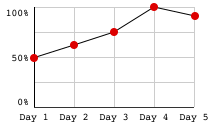: final amount
: initial amount
: Annual interest rate
: total time given in years
: number of times compounded in a year, if
|
Compound daily: |
n = 365 |
|
Compound monthly: |
n = 12 |
|
Compound quarterly: |
n = 4 |
|
Compound semi-annually: |
n = 2 |
|
Compound annually: |
n = 1 |






